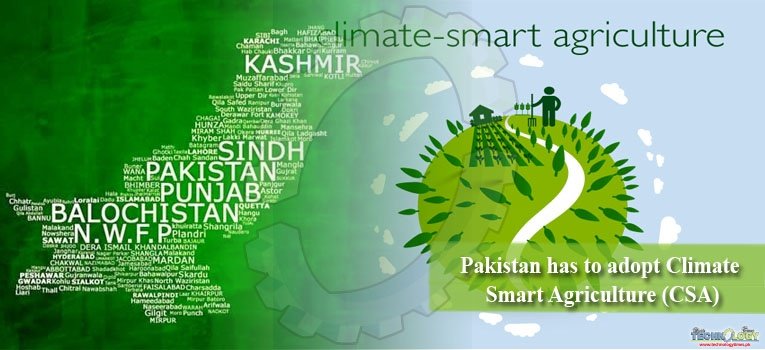Climate-Smart Agriculture (CSA) can be defined as a technique of reorienting and transforming agricultural development with accordance to the new fact of climate change or Agriculture which sustainably enhances productivity, increases resilience (adaptation), removes or reduces GHGS (mitigation) when possible or enhances procurements of national food security and development goals.

The principal goal of CSA is food security and development while productivity, adaptation, and mitigation are identified as the three interlinked pillars necessary for achieving this goal. The need for shifting towards CSA (Climate Smart Agriculture) practices in due to climate change. Climate change is a radical change in weather condition on long term basis.
For example, it is change in the temperature, precipitation of a specific place from one decade to the next decade. The previous decade of 20th century and current decade of 21st century has registered as warmest period in the overall global temperature records. Pakistan exists in south Asian region of the world in which almost 23% of world population lives. It is badly affected due to climate change, global warming, floods, endemic morbidity, storms, and heat waves. It is reported that almost 30% of the crop yield would decrease up to 2050.
According to IPCC report (2007) about 90% increase in the average mean global temperature from 20th century until now is due to greenhouse gases and anthropogenic activities. From year 1750 to 2012, the level of atmospheric CO2 has increased from 280 ppm to 395 ppm, concentration of N2O has raised to 323 ppb from 227ppb and CH4 mass has jumped from 200 ppm to 300 ppm. The Global Warming Potential (GWP) for these 3 gases N2O, CO2 and CH4 are 310, 1 and 25 respectively.
The alarming situation is that in previous 130 years, mean global temperature raised to 0.6-1.2°f (0.3 to 0.7°c) and it is reported that future increase in the global mean temperature will be 0.4°f (0.2°c) in each decade. Among economic sector, agriculture will be drastically affected by global warming and climate change. It is outlined that global warming will severely affect rainfall pattern which will affect the agricultural regions that depends on rainfall for crop production.
According to report of Global Climate Risk Index (2017) Pakistan is placed 7th among climate effect countries losing $ 3.8 billion and 0.6 percent of the its GDP. Therefore, there is a need to modify our agriculture sector according to climate change. One of the recent concept is climate smart agriculture.
Some climate smart practices which are on its initial stages in Pakistan are alternative wet and drying of paddies, laser land leveling ,conservation agriculture ,no-till practices, biological pest management, renewable energy technologies in agricultural production systems and precision farming. These practices can be adopted in region by keeping in mind the following points in any area: intense heat conditions, drought conditions, flood conditions, what type of water management strategies are prevailing in that area, what kind of crop varieties are growing in that area, livestock, manure management practices and pest management practices of an area.
The practices like raised bed planting of maize ,alternative wet and drying of paddy rice and laser land leveling can save 30 to 40 percent of the water for example In AWD practice ,we give irrigation to the paddy fields only when require, after giving first irrigation to paddy field to 5cm above the soil surface ,let the water go down below 15cm under the soil after that second irrigation give to field where as laser land leveling leads towards the uniform field preparation results in even distribution of the water.
In this way water can be conserve which become scarce due to climate change (melting of glaciers). whereas precision farming helps the farmers in decision making about crop science by relating to the farm practices to the crop’s need, to build up a farm record, improving marketing of farm products by foster greater traceability, better lease arrangements and relationship with landlords increases the inherent quality of farm products (such as protein level of bread-flour wheat) etc.
The expenditure levels of climate has been low in the past years, the country’s novel Pakistan Climate Change Act (PCCA: 2017) adjust the level for the Pakistan Climate Change Fund and Pakistan Climate Change Authority. These are expected to mobilize international and domestic funds for adaptation and mitigation interventions across the country which including CSA.
CSA can play an efficient role in the Pakistani’s economy. Modern Technological practices like solar powered irrigation system and laser land leveling can be used for better utilization of resources. Manage-mental changes like proper cropping patterns, crop diversification and optimized planting dates can compete best with changing environment.
Investing in research should be done to develop high yielding, drought resistant, pest tolerant or heat resistant crop varieties along with livestock breeds. Financing by local and international resources particularly to smallholders is most important for widespread implementation and adoption of CSA.
Authors: Naeem Ahmad*, Dr. Muhammad Umer Chatha,
Dr. Imran Khan, Ahmad Latif Virk, Muhammad Umair Hassan,
Hafiz Muhammad Waseem, Muhammad Usman.